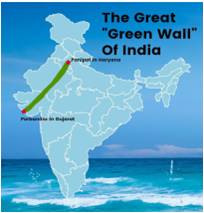As our Union Minister of Environment, Forest and Climate Change Shri Prakash Javadekar highlighted ‘the need to bring 26 million hectares under Land Restoration targets’, it is important to address the global crises of climate and biodiversity loss’
 It is appreciative of India’s outstanding leadership at COP14 UNCCD, bringing more than 9000 participants at the multi-stakeholder forum. The multi-stakeholder international forum was applauded across the globe and highlighted India’s commitment towards addressal of Drought, Land Degradation and Desertification. India has determined to bring 26 million hectares under land restoration targets and address the global crises of climate and biodiversity loss. Hence, it becomes imperative for India to set a precedent towards building long-term drought resilience.
It is appreciative of India’s outstanding leadership at COP14 UNCCD, bringing more than 9000 participants at the multi-stakeholder forum. The multi-stakeholder international forum was applauded across the globe and highlighted India’s commitment towards addressal of Drought, Land Degradation and Desertification. India has determined to bring 26 million hectares under land restoration targets and address the global crises of climate and biodiversity loss. Hence, it becomes imperative for India to set a precedent towards building long-term drought resilience.
India Water Foundation had organized a Special session ‘Can Integrated Approach combat Drought in the Region?’ on the sidelines of UNCCD COP14 on 11th September which received positive response from stakeholders. It was a successful endeavor with Quality Discussions by Multidisciplinary stakeholders on Drought Resilience, Drought-risk assessments, Drought management, Land Restoration strategies towards Climate Neutrality, Disaster linked Drought phenomenon, etc. to reach common consensus towards addressing the menace of Drought. The session also called for adaptation & mitigation developing measures towards management of Drought and Land Degradation (SDG 15.3).
India Water Foundation has been granted the Observer status of the United Nations Convention to Combat Desertification (UNCCD). This sets a right stage to play an instrumental role towards implementation of the priorities of UNCCD and also the outcomes of COP14 UNCCD. Support climate change mitigation and adaptation measures through improved understanding and sharing knowledge on new initiatives, policies and best green practices, developing strategies with special focus on biodiversity conservation including ecosystem management.
Desertification (UNCCD). This sets a right stage to play an instrumental role towards implementation of the priorities of UNCCD and also the outcomes of COP14 UNCCD. Support climate change mitigation and adaptation measures through improved understanding and sharing knowledge on new initiatives, policies and best green practices, developing strategies with special focus on biodiversity conservation including ecosystem management.
Now that, the Indian government has planned to create a 1400 km-long and 5 km wide ‘Green Belt’ from Gujarat to Delhi-Haryana border, it’s a stepping stone to restore degraded land along the Aravalli hill range. The desertification and land degradation atlas released by the ISRO in 2016 revealed that more than 50% of land is degraded in the states of Gujarat, Rajasthan and Delhi. With this move, visible outcomes is envisaged with the addressal of synergies between water, bio-diversity and climate change, strengthening our momentum towards Drought Management on one hand and creation of Sustainable Livelihood and Cleaner Environment on the other. However, this must be enforced especially at grass root level to achieve holistic implementation of SDGs and will also bring the Delhi Declaration to fruition. Let’s ACT NOW.
By Dr. Arvind Kumar, President, India Water Foundation
Article published in SME World Magazine | December 2019 | P.No. 38



